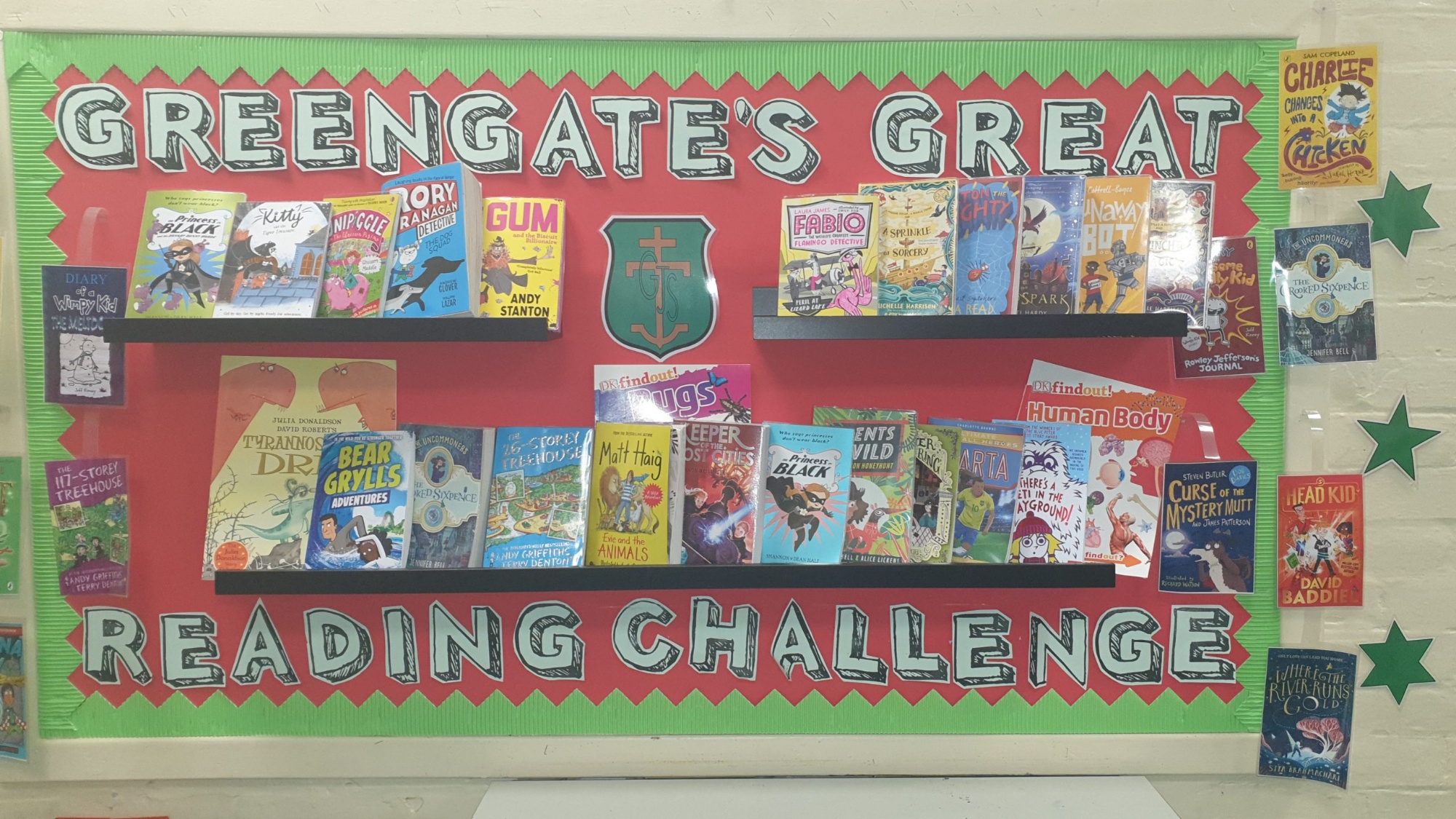English Intent
Intent, Implementation and Impact
The national curriculum for English aims to ensure that all pupils:
- Read easily, fluently and with good understanding
- Develop the habit of reading widely and often, for both pleasure and information
- Acquire a wide vocabulary, an understanding of grammar and knowledge of linguistic conventions for reading, writing and spoken language
- Appreciate our rich and varied literary heritage
- Write clearly, accurately and coherently, adapting their language and style in and for a range of contexts, purposes and audiences
- Use discussion in order to learn; they should be able to elaborate and explain clearly their understanding and ideas
- Are competent in the arts of speaking and listening, making formal presentations, demonstrating to others and participating in debate

Intent
At Greengate Junior School our intent is to provide an inspirational English curriculum for our children that allows them to develop into confident, creative writers, readers and communicators.
We understand that developing strong literacy skills in primary school plays a key role in the ability of children to successfully navigate the later years of their school life, and indeed the years beyond education.
Here at Greengate, it is our aim to do this by immersing children in a fun, engaging curriculum that is tailored to their needs, responsive to the different speeds at which children learn and sensitive to the challenges that all children face on their learning journey.
Having a well-planned, carefully structured progression of skills that runs from the beginning of year three to the end of year 6 allows us to have high expectations of all children.
At the heart of this is the intention of all staff here at Greengate to instil a love of reading, writing and discussion in our children that will have a positive impact on their development during their time here, and a lasting impact on their lives.
Implementation
In all classes at Greengate, English lessons are taught in units that are planned around high-quality, challenging texts. The children are immersed in this engaging narrative (or non-fiction text), over several weeks, exploring characters, settings, storylines and themes. These units are planned using writing initiatives such as Pie Corbett’s ‘Talk for Writing’ and CLPE’s ‘Power of Reading’. The writing skills developed in these lessons are carefully selected so that they form part of a whole-school skills progression. This allows children to master age-appropriate skills quickly and enables the teachers at Greengate to provide timely challenge or support where it is needed.
We believe that children’s learning is enhanced when they are writing for a purpose. Because of this, we structure our units in a way that allows teachers and their classes to focus on one key writing purpose at a time – writing to entertain, persuade or inform. This approach means that children spend several weeks gaining a thorough understanding of how to write for a specific purpose and what skills to employ.
The teaching of these skills takes place very day. Within these English lessons, teachers use the chosen text to analyse and model positive writing techniques through a huge variety of activities, challenges, discussions and games. The children adopt these skills and gradually learn to apply them in fun and exciting ways.
Grammar is taught within these lessons, carefully embedded in the units so that children learn the correct use of grammar while engaged in the class book. They will learn about the use of inverted commas while building conversations between their favourite characters, for example. This avoids grammar being taught as a detached, abstract part of the writing process and helps children retain what they have learned.
When marking this work, teachers leave next steps in books so that children know exactly what they need to do to make progress. They enjoy responding to these marking prompts in purple pen. Anyone identified as working above or below age-related expectations is given support or challenges to help them take the next step on their learning journey.
Reading is an integral part of most English lessons at Greengate but it also taught in additional reading sessions that take place at least twice a week. Through whole-class discussion and shared reading activities, these guided lessons provide a deeper understanding of, what characters are thinking, how they are feeling and why they act the way they do. Through careful questioning, children learn how stories and non-fiction writing is constructed and in doing so, develop their comprehension skills and their ability to better understand and interpret the books they read.
Reading is fundamental to everything we do at Greengate. We are aware of the impact it has on the development of children in all subjects. On top of the consistent, rigorous focus in lessons, we use vibrant displays, read-at-home initiatives, reward schemes, author visits, celebration events and exciting reading initiatives like the popular ‘Spellbinding’ book award, to raise the profile of reading so that children see it as a pastime to be cherished.
Here at Greengate, we also utilise the ‘Spelling Shed’ resource in all year groups to plan and deliver additional spelling sessions. This is universally popular with our children, who love the challenging, competitive nature of the online activities. It also allows teachers to track the progress of individuals or groups of children and tailor the content of spelling sessions to suit their needs.
Impact
By immersing children in high quality texts and focusing on skills and the enjoyment of English, children develop an enthusiasm for the subject. They enjoy talking about their favourite books, discussing the stories they’re writing, and sharing their achievements with other children.
Children’s books show that they continually adopt new writing skills as they progress through the school while drawing inspiration from the books they read in class. Children’s writing is assessed at the start of the year and at the end of each term. This formal assessment complements the day-to-day assessment that takes place in classrooms and in books.
Children are also encouraged to assess their own work. Evaluating their own progress often feeds their eagerness to reach new targets and enables children to talk freely and enthusiastically about their next steps.
